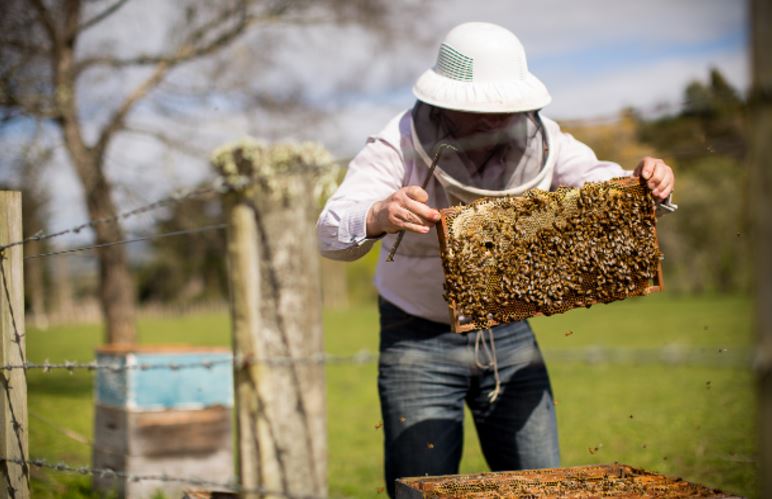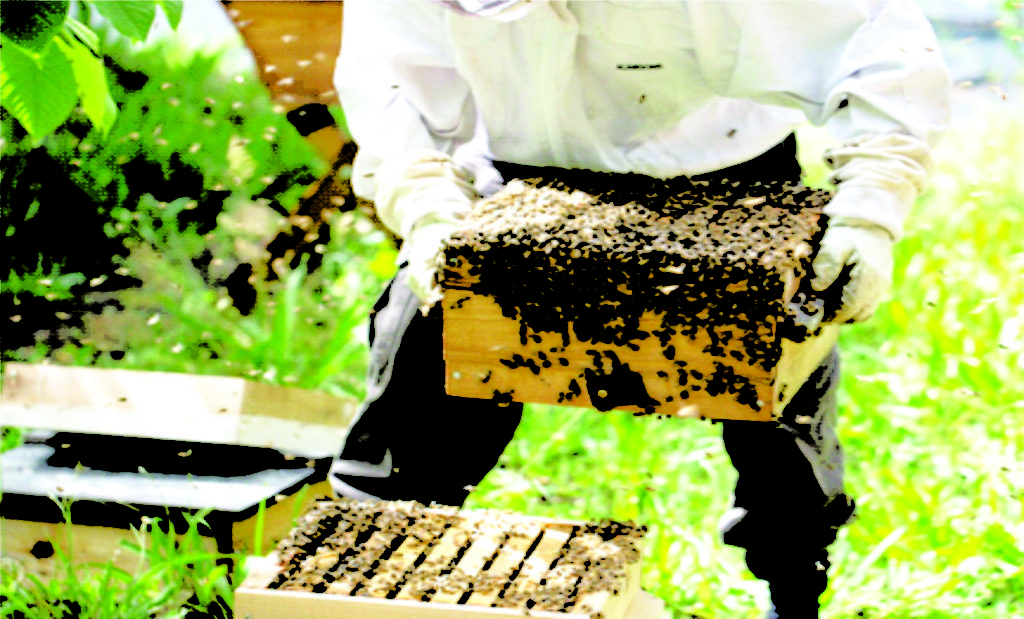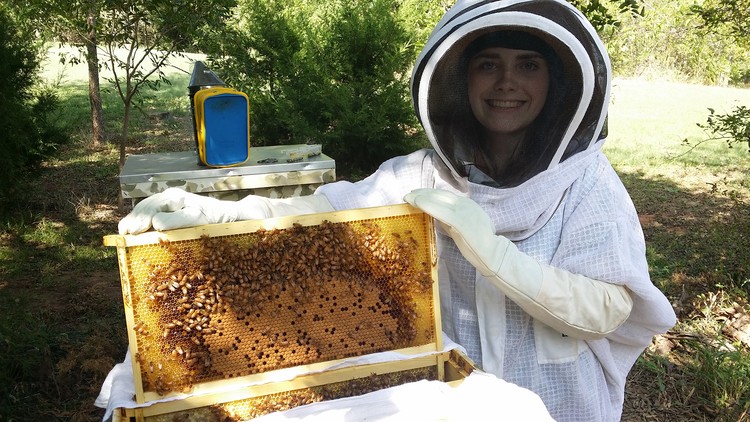FEATURED
How to Start Bee Farming in Nigeria & Make Money:

Bee farming is the process of raising bees in order to collect honey or any other products like propolis, beeswax, pollen propolis and royal jelly. Are you seeking another source of income? Are you thinking agribusiness in Nigeria? If yes, Beekeeping or Bee farming may be the right agribusiness to start. Seat back and relax while i tell you all you need to know about bee farming.

The value of global trade of honey, besides other bee products, is estimated to be over $600 million, and in Africa, honey is produced in Ethiopia, Kenya, and Tanzania, which are the largest honey producers on the continent, and in large markets like Nigeria having a high demand for honey. You might want to get into bee farming
A bee farmer takes care of bees for honey production and pollination. Bee farming is a profitable business, which you can set up with less than one hundred and fifty thousand naira, without additional costs thereafter. Why is this so? Well! The bees do not require daily care and you would not need labor until harvest and processing period.
Secondly, bees provide many products apart from the honey you use in many ways Other bees produce that are in high demand include beeswax, which is widely used in both the skincare and cosmetic industries, as well as in shoe, furniture and candle manufacturing, propolis, which is used in medicines and cosmetic products, and honey bee venom, also known as apitoxin, commonly used as treatment for rheumatism and other joint diseases, as well as desensitizing people who are allergic to bee stings and insect bites.
If you are already a farmer, and you are interested in keeping bees, it’s advisable that you site your apiary (location where bees will be kept) in the midst of fruit trees such as mango, citrus, etc.
Placing bee hives in a fruit farm will boost pollination; thereby, multiplying the harvest, as bees are popularly referred to as agents of pollination.
What You Need to start Bee farming in Nigeria

1. Get Bee farming Training and Get Bee Farming Business Plan:
The first and most important step when starting bee farming in Nigeria is getting trained and creating a business plan.
You can find consultancy services on Fufatrade if you need a beekeeping training
Creating a business plan will help you achieve success where others without a business plan fail.Moreover, you need to get the required training from bee keeping experts before you venture into the business.
While online guides and YouTube videos might give you a head start, nothing beats a hands-on training you will get at a reputable bee farm. You will need to learn how to keep bees, where to site them, and how to protect yourself from them. Therefore, after acquiring the training should you write a business plan.
While writing the plan, you need to know how much capital would be required for the business and then calculate how much profit would be earned from the business, plus, how to generate the required capital. Additionally, your beekeeping marketing strategies should also be spelt out win your business plan. Without advertising, there’s little or no chance of making profit.
2. Get Capital:
If you are just starting, you might want to start with little capital. This might be as a result of your purse or you just want to start little, see how far you can cope with the beekeeping business, before splurging more money into it.
Key costs to consider in the bee business are:
- A place to process the honey harvested.
- The hives for keeping the honey.
- Tables and chairs.
- Honey extractor and separator. This equipment is used by large-scale farmers. Small scale farmers can use a sieve.
Minor costs are:
- Getting locally made protective clothing.
- Smoker- this can also be made locally.
- Trays and tools such as hive tools.
3. Get Equipment & Location
After acquiring knowledge, creating a business plan and getting capital the next step is getting the required location and equipment for your bee keeping business.
As mentioned earlier, you can either lease a land, or partner with farmers who have fruit trees in their farm lands. Your apiary must be in best conditions so can you can have a good return on investment. One major tip for locating your apiary is: never site your apiary in a noisy or crowded place.
And steer clear of swampy areas or places where insecticides are applied. After securing a suitable location, the next step is to choose the types of bees you want to keep and buy the necessary equipment (preferably new ones). During your training, you will learn about the types of bee species and their yield rates. Bee species include the honey bee, bumble bee, mason bee, solitary bee, etc.
Equipment’s you need:
- Bee hives : A hive is a box for keeping the bees. The hives can be made from various materials, and their functions are to ensure that the bees build their nests so that they can be managed easily; and also to aid easy movement for the bees.
- bee suits, smokers
- buckets
- jungle boots
- wheelbarrows
- basins
- honey extractor
- packaging machine
- weighing scales
- rubber plastics of various sizes
- nylons for packaging
- sealing machine
- A stand-by generator (optional).
After securing the equipment, set the apiary in a place where the bees can easily find food and water, as this determines the success of your business
4. Know Your Business:
Bee farming is more of a seasonal farming; therefore, it’s very important that it is properly managed.
While farming bees, it’s important that you know the right time to begin a colony so that you don’t get a wrong produce from your bee farm. For example, if you start your colony too early, your bees might not get enough food, while starting too late will make your bees produce less honey because they will certainly miss out on major push of nectar.
Also, good source of water, sugar and sufficient space for feeders are all essential to the growth of a bee farm. Taking care of bees is a bit complicated; therefore, it is important that you stick strictly to the training you were given.
Do not try out much new things at a time and don’t use your investment as a trial and error. It’s better to become a pro at it by doing thing gradually, before taking much risks. Also ensure that your bees get medication.
5. Where To Sell
There’s no business in Nigeria, and over the world that makes money without advertising its products or services. Bee keeping is no different. How do you make profit from your capital? Let people know who you are and what you can offer them. and there is no better place than to sell on Fufatrade the best online marketplace in Nigeria to meet real people
Moreover, if you produce quality honey, you will have customers and bigwigs like pharmacies and industrial companies lining to purchase honey from you. A pro tip is to be a reliability rock star- let your clients know you can supply honey to them within a short period of time.
Other forms of marketing include:
- Word of mouth from satisfied customers
- Making souvenirs with your brand printed on items like notebooks, face caps, shirts, pens, hand bands, etc.
- Magazine publications
- Online marketing via website or blog; social media marketing via Facebook, Pinterest, Instagram, Google Ads, etc
- Providing free seminars
- Making handbills, etc.
How You Make Your Profits

Let us assume you invested money to start 10 colonies and these colonies produce 10 liters of honey at harvest.
Assume investment of N10,000 per colony x 10 colonies = N100,000
One Colony produces 10 liters of honey per harvest
Retail price in the market is N1,500 per liter
Sales of 10 liters of honey from one colony will be 10 x N1,500 = N15,000
Therefore sales for 10 colonies at N15,000 per colony x 10 colonies = N150,000
Less cost of sales i.e. 150,000 – 100,000 = Gross profit of N50,000
Gross profit less other expense of N10,000 i.e. 50,000 – 10,000 = N40,000 Net profit is N40, 000 or 40% Return on investmentThe farmers’ main source of income is from bee farming and selling the product locally, which accounts for 90% of all sales. However, problems such as deforestation and climate change are existing threats that result in a smaller yield and low seasonal production.
Africa’s leading honey and beeswax producer is Ethiopia; however, honey production is still largely traditional, only reaching around 10% of its potential. Various projects, including the International Centre of Insect Physiology and Ecology (ICIPE), as well as the MasterCard Foundation, are assisting farmers with technical training and modern beehives to increase productivity and yield.
How Many Months Before Harvesting Bee?
If you have just started a fresh colony of bees, allow ten to twelve months for the honey to mature before you begin harvest. Subsequently, if the colony is fully established, you can harvest between seven to eight months.
Why Should You Start Bee Farming?
There are many important reasons why beekeeping in Nigeria is the best agribusiness for you. Some of such reasons are:
- Honey is a good source of nutrition to human diet. It is a rich source of carbohydrate, minerals, and vitamins.
- Honey keeps the human body mentally alert and physically strong.
- It is a complement of many traditional and orthodox medicines.
- It helps preserve the ecosystem, and increases production of a particular farm crops via pollination.
- It increases your revenue generation as you process it on the farm. This in turn, adds more value to the raw products.
If i have been able to open your eyes and convinced you to venture into this business, know that the first place you can start selling is on Fufatrade where you dont have to stand alone as they give incentives too.. please share this post and follow fufagist on our social media platforms to be in the loop for the next amazing article








